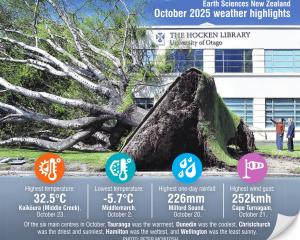
On Wednesday though Stephenson tried bungee jumping, zip lining and white water rafting all at once when asking a Parliamentary Question which he knew was almost certainly going to eventually incur the wrath of Speaker Gerry Brownlee.
The Speaker’s job is to try to maintain order in the House, but if MPs are truly determined to cause trouble — as all too many have been this session — in reality they have very few tools to achieve that.
Ruling questions out of order and rigorously enforcing standing orders is all very well, but when faced with devious MPs who have artfully created workarounds to fire shots across the House the Speaker is often left sitting there ruefully shaking his head and moving on to the next question.

All of this, not unnaturally, drives the Opposition in general — and Labour in particular — up the wall. Leader Chris Hipkins and shadow leader of the House Kieran McAnulty take a series of points of order each day, each of which are in essence a moan that the government is being mean to them.
They are right, the governing parties do spend an inordinate amount of time blaming Labour and the Greens for everything ... but it’s not like the "nine long years of neglect" refrain Labour used ad infinitum to taunt National while it was in power was any different.
But the subtext, sometimes overtly stated, is that Labour thinks Mr Brownlee is letting his colleagues get away with it, a claim guaranteed to rankle the man in the big chair.
It all adds up to make Brownlee an increasingly isolated and deeply frustrated figure at the front of the debating chamber, and may well explain why Greens co-leader Chloe Swarbrick copped such a cruel and unusual punishment when the Speaker finally snapped a couple of weeks ago.
Stephenson’s leader David Seymour is another MP who likes to test the Speaker to his limits and on Wednesday he already copped a reprimand from Brownlee for taking a snarky swipe at Greens co-leader Marama Davidson earlier in Question Time.
Hence trouble was sure to be brewing when Stephenson asked question 4 of the Associate Minister of Health — aka David Seymour — about what recent reports he had seen about Medsafe?
Ministers are asked about recent reports every day, for one of two reasons: either to highlight an announcement they have just made, or to disparage a policy of the former government that they are about to repeal. Brownlee would have had no doubt that whatever the Act MPs were up to, that no good could come of it.
Things started innocuously, with Seymour highlighting some good news statistics from Medsafe’s annual report.
Stephenson then asked by how many working days had Medsafe reduced approval times over the last two years, and how did that compare with international benchmarks, and at that point things started to go off the rails.

"And for the member who has just sprung into life — although perhaps not mentally," Seymour retorted before the Speaker knocked that on the head.
"No, that’s it. That’s the end of the question. That’s the end of the question. The member will sit down."
At which point Stephenson, with trepidation, asked for a supplementary question.
"Well, you might call a supplementary. I just said it’s the end of the question," Brownlee snapped.
"We’re not going to go down those tracks. So ask your supplementary but I hope the answer is appropriate," he rumbled ominously.
And with good reason, as Labour deputy leader Carmel Sepuloni chose to relitigate the previous answer, leading Mr Speaker to bring Question 4 to a close — but not before Seymour tacked on the answer to the supplementary Stephenson had never got to ask.
Stephenson was on far safer territory later in the day when he returned to the fray to make Act’s contribution to the third reading debate on the Evidence (Giving Family Violence Evidence in Family Court Proceedings) Amendment Bill.
This is that rarest of things, a Labour member’s Bill which the government has backed at every stage. In something of a red letter day for the Opposition, on Wednesday it got another Bill through the House with National’s backing.
Tracey McLellan’s evidence Bill had all party backing because it is eminently sensible and long overdue: it extends the range of protection procedures for parties and witnesses giving evidence of family violence in the Family Court to closely resemble those available to those afforded to participants in criminal trials.
Previously Family Court witnesses and parties had to apply for judicial permission to testify through methods such as video recording, behind screens or via video-link. Now witnesses in family violence cases are automatically entitled to do so — although there is a "judicial discretion" caveat so that the judge can ensure the proceedings are fair.
Stephenson sits on the justice select committee, which considered the Bill; he and Act voted for it at all stages.
"We all worked together to get to something that this House looks likely to pass tonight and actually make a difference for victims of family violence," he said.
"There’s no point in this place just putting up ideas and things, and people not being willing to compromise and work through practical solutions, because then we just sometimes don’t get things done. It was a really great process because the member in charge was able to weigh up the pros and cons, we got advice, and we actually are putting in place something that will get done and make a difference."
If only the Speaker and the other MPs could do the same.












